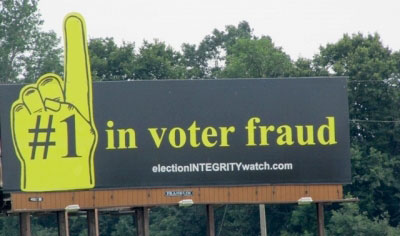How common is election fraud?
“There are three things in the world
that deserve no mercy, hypocrisy, fraud, and tyranny.”
—Frederick W. Robertson
As some condo owners have learnt, rigged elections gives us all three;
hypocrisy, fraud and tyranny.
Too bad condominium
election fraud wasn't a felony
Board
elections are manipulated by board presidents and directors who do not want to lose power and by property
managers
and lawyers who have no desire to lose
cash-cow accounts.
How common is rigging elections?
Hard to tell. After all, it is not
something people openly brag about and the condo industry magazines are not
going to print articles on "Five Effective Ways to Rig a Condo Election".
However, I know that election tampering is far more common than I first thought and
it
is at third-world levels at many condo corporations in Ontario.
When
Florida appointed America’s first Condominium Ombudsman, one task he
had was to appoint election monitors to conduct board of director
elections. Preventing election misconduct and manipulation was seen as
a priority.
In his book, Condo Board Election
Revolt, Valmore
Lucier listed
50 different ways condo elections in Florida were tampered with. I have
not come across that many tricks but after talking with condo owners
here in the Greater Toronto Area and reading their AGM
packages, I have complied a fairly
impressive list.
Election fraud
in our society
Election fraud can be a serious concern in:
• political party riding associations
• political elections
• trade
union elections
• corporate director elections
• non-profit corporations
• social club elections
• voting for music awards
• hosting the Olympic games
All of the above examples have been tainted by election fraud.
Elections—inexperienced
owners
Here is one example of many outrageous election frauds committed
by board of directors and the property managers at condo meetings.
At the first AGM after the turnover meeting, there was an election for
all three directors. This is a condo corporation that has both
commercial and residential units. The builder's lawyer chaired the
meeting.
The Act calls for one director, the owner-occupied position, to be
voted by only the
owner-residents and the other two positions voted on by all the owners.
Therefore, there should be two elections; one for the director elected
only by the owner-residents and a second election for the other two
directors.
This is important because the vast majority of the resident-owners were
unhappy with the builder's board and wanted a change.
However, the owner-residents didn't realize that there should be a
separate election for owner-occupied position that only they could vote
for.
The
chairman (a prominent condominium lawyer) and the property manager
distributed only one ballot to elect
all three directors and so the builder, by using his commercial units
votes and
all the absentee owner proxies, retained total control of the board.
top contents
chapter previous next

